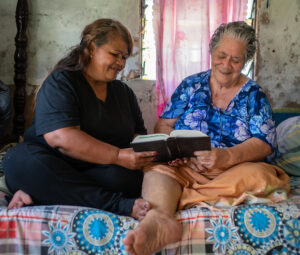
Family caregiving can be rewarding but also challenging. When caregivers do not have the support they need, their health, well-being and quality of life often suffer. So in 2018, Congress passed the RAISE (Recognize, Assist, Include, Support & Engage) Family Caregiving Act. The law directs the Secretary of Health and Human Services to develop a national family caregiving strategy and establish a Family Caregiving Advisory Council to provide recommendations on effective models of both family caregiving and support and improve coordination across federal government programs.
The Administration for Community Living (ACL), the lead agency on the initiative, delivered its initial report to Congress on September 22. The report is the culmination of a two-year, multi-faceted effort that gathered input from family caregivers across the country. It provides an overview of many of the issues family caregivers face nationwide and provides recommendations for addressing them.
The report comes at a time when the issue of caregiving is front and center as the fragility of our caregiving system finally became more visible to the general public, according to Allison Barkoff, acting administrator and assistant secretary for aging at the Administration for Community Living. “The last 18 months of the COVID pandemic has shone a spotlight on the importance of family caregiving and how family caregivers have to step in to fill the gaps in our long term care system, gaps that have been exacerbated throughout the pandemic,” she told reporters during a video briefing.
The report underscores the needs that an estimated 53 million family caregivers have for training, support and opportunities, and more rest and self-care. It details the lost income, increased stress and increased social isolation that many family caregivers have experienced. It also shines a light on the many positive aspects of family caregiving, including the tremendous satisfaction and feelings of accomplishment that many experience. The report draws heavily on more than 1,600 comments submitted by caregivers, caregiving advocates and other stakeholders. It also analyzes caregiving efforts across the federal government, including throughout the Department of Health and Human Services, the Consumer Financial Protection Bureau, AmeriCorps and the departments of education, labor and Veterans Affairs, according to ACL.
The report’s 26 recommendations fall under five goals:
- Increasing awareness of family caregivers to increase public understanding of caregivers’ contributions, including helping people self-identify as caregivers to get the support they need.
- Engaging family caregivers as partners in health care and long-term services and supports to better integrate family caregivers into health care processes and systems.
- Improving access to services and supports for family caregivers, including counseling, respite care, peer support, training in common in-home medical tasks and practical assistance such as transportation. Also included is a recommendation for strengthening the paid caregiver workforce.
- Financial and workplace security for family caregivers to decrease the impact family caregiving can have on the financial well-being and the professional lives of caregivers.
- Generating research, data, and evidence-informed practices to help create policies and interventions that meaningfully help family caregivers.
The report includes interviews with 26 caregivers representing a range of caregiving situations and needs throughout the U.S. There is also a comprehensive list (.docx) of federally funded efforts to support caregivers.
“Family caregivers are the backbone of care in the United States, but unfortunately not adequately supported by federal, state, or local policies, or by health care providers and employers,” said Nancy Murray, co-chair of the family caregiving Advisory Council and president of the ARC of Greater Pittsburgh, a human rights advocacy group. The economic value of family caregiving is estimated at $470 billion every year, which is more than the U.S. spends annually on all long-term services and supports. Lost income due to family caregiving is estimated at $522 billion each year.
The RAISE Act, “when fully implemented, will result in the first comprehensive national strategy for better supporting family caregivers,” said Murray, who is herself a family caregiver.
The recommendations from the report outline critical actions that can be taken at the federal and state levels and by local communities, philanthropic organizations, health care providers and providers of long-term services, among others, to better support family caregivers.
Sarah Hornback, for example, quit her job as a school administrator to become a full-time caregiver when her husband was diagnosed with younger-onset Alzheimer’s disease. Instead of continuing to put away extra money for the future, they had to navigate the financial hardship of early retirement and increased health care and caregiving costs. “Family caregivers are somewhat marginalized,” she said at the briefing. “There’s not a lot of training or support, particularly if you have resources. I would say to the current administration that we need a sense of urgency. And we need a sense that we are valued partners in the health care system.”
The budget reconciliation bill making its way through Congress would expand paid family and sick leave, expand access to home- and community-based services (HCBS) and strengthen the HCBS workforce by addressing staffing shortages and supporting elder justice programs.
“A family caregiver’s main goal is to promote independence and community living,” said Alan Stevens, Ph.D., director of the Center for Applied Health Research, and a professor at Texas A&M Health Science Center. “We also need to keep in mind that the caregiver’s autonomy and need to integrate socialization — and perhaps even outside the home — is an element of that autonomy.”
Stevens stressed the importance of expanding home and community services, which takes the broader view of providing that care to achieve autonomy for both the caregiver and care recipient. It’s not yet clear how much, if any, additional HCBS funding will make it through the budget process.
Reporters can use the resources in this report to see how well their communities are responding to the needs of family caregivers; speak with local caregivers to learn more about their specific needs and what else needs to be done.






